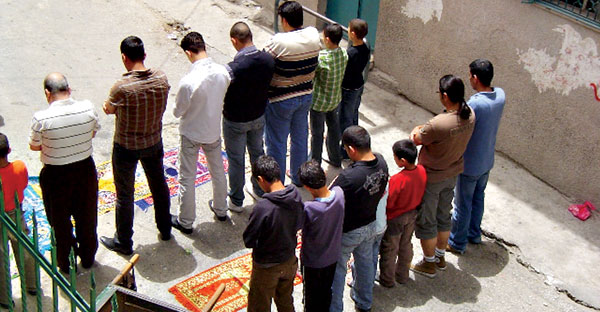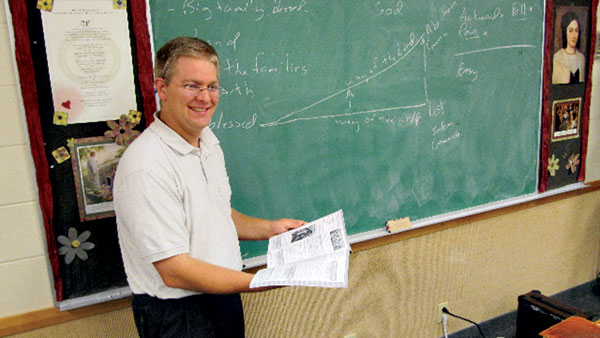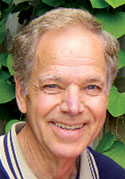In our increasingly multicultural and multi-faith society, can we learn from belief systems other than our own? I believe so, and offer what I have learned from two faiths—Mormonism and Islam—that have very diverse beliefs from each other and also from my own Mennonite faith. This has called for risk-taking, relationship-building and honest self-reflection.
What I’ve learned from Mormons
Some time ago I wrote to the headquarters of the Church of Jesus Christ of Latter Day Saints (LDS)—the Mormon Church—in Salt Lake City, Utah, saying, “I am the pastor of a Mennonite church interested in how your church nurtures children and sends your young people into mission.”
We received a quick affirmative reply that a visit would be welcomed. When we arrived, a retired medical doctor and his wife graciously took us out to lunch and then on a tour of a large LDS relief program, the church’s educational supply centre and film studio. We enjoyed the day and noted how our host couple shared their faith in Christ’s atonement for their sin, in the Book of Mormon, and in the empowerment of the Holy Spirit for moral living.
A couple with four children invited us for their evening meal and the night. Before the meal, one of the children prayed a spontaneous prayer of thanks, after which the parents led the family in a lively conversation. After dinner, a church elder with an apprentice came to share a short lesson on prayer and to interact with the family. Before retiring, we gathered around the piano to sing several hymns followed by a reading from the Bible. Then we knelt in a circle for a time of prayer.
The children were each anticipating two years of mission service when their time came. The mother had trained as a lawyer and was now finding fulfillment in her roles as mother and president of the welfare society of their ward. She proudly showed us their food pantry, which had sufficient food to last their family and neighbours through a year of famine if needed.
Since that time, I have discovered that Mennonites and Mormons have a number of things in common. We both have a heritage that includes intense suffering for our faith. We both have a strong concern for family, high moral standards and missions.
It is also obvious that Mennonites and Mormons differ widely in theology. LDS members believe that God the Father exists in physical form, that the Book of Mormon is inspired scripture, and that restoration of the church was brought about through Joseph Smith. Mormons allow themselves to be baptized on behalf of the dead, believe that marriages performed in one of their temples will last eternally and that humans have the potential to become gods.
Do our strong and divergent doctrinal differences mean that we have nothing to learn from them and they from us? While I am at 180-degree odds with much of Mormon theology, let me share four things that I have learned from their practices:
- Another way of doing pastoral care
In many Mennonite churches the pastors do most of the pastoral care. In my own ministry I championed small groups as the basic pastoral structure of the church. Mormons, however, have neither paid pastors nor small groups. Instead, elder teams visit each household once a month.
“What do you do during a home visit?” I asked an elder.
“We go prepared to teach one of our gospel principles,” came the response. “But even more important, we go prepared to do whatever is needed in that home. Sometimes that might be trimming a tree while at another time it is helping a family make a difficult decision.”
“They sometimes shoot hoops with me,” said one teenager with appreciation. “They take interest in my school and friends,” said another.
At the end of a visit to our home, an elder team offered pastoral care to me by asking, “Is there anything we can do to help you?” I had just purchased a printer and was having difficulty getting it set up properly. “Let’s take a look,” they offered with eager excitement. They helped me interpret the directions, crawled under my desk to connect the wires and within a short time had my problem solved.
- Another way to share our faith
Mormons and Mennonites both believe that the Reformation was inadequate. Our forebears believed, although differently, that, instead of mere reformation, the church needed to be restored to the model that Jesus Christ intended. Mormons believe that their church was restored through Joseph Smith and that it contains the organization and fullness of the gospel that Jesus intended. Mennonites look to the New Testament church for guidance and see the fullness of the gospel in terms of discipleship made possible by the Holy Spirit.
Through interaction with Mormons I have gained a new zeal for sharing my faith and have learned anew how important and strengthening it is to work in teams. Mormons send each other out in teams of two, as Jesus sent out the 70 in Luke 10 to witness. Through the witness of these teams—which is done very differently than Jehovah’s Witnesses do it—they have grown very rapidly.
Might we also develop stronger practices of visiting, teaching and working in teams of two?
- Additional ways to share what has been revealed
Mormons strongly affirm that revelation did not cease with the prophets or with the closing of the biblical canon. They see the Book of Mormon as “another testament of Jesus Christ,” and look to the presidents of their denomination as living prophets on earth. Mormons also practise a special ordinance after baptism that they believe enables each new believer to receive the Holy Spirit and be empowered to share revelations from God. Each Sunday, instead of a sermon, a youth and two lay speakers are invited to share what has been revealed to them. In time, everyone gets to share their faith in public.
While I do not agree that the Book of Mormon is an equally revealed word from God, I do believe that God is still speaking and revealing his will to us. I have been challenged to look for new opportunities and creative ways for our youth and adult members to share what God is revealing in their lives and doing in the world.
- Another way to educate our youth
While I attended three Mennonite schools and am strongly committed to them, I have learned that there are other ways to educate our youth. Every weekday morning, about two-thirds of LDS high school students gather at one of their churches from 6:30 to 7:15 for a time of fellowship, study and prayer. Strong peer relationships develop over the four years, which help them to sustain a high level of moral living. Students who attend 80 percent of the classes are honoured with a special graduation exercise.
What might we learn from this? Do we have church communities where we might convene our youth for 45 minutes of fellowship, study and prayer before they go to their public schools?
What I’ve learned from Muslims
Another opportunity to learn from a different belief system came three years ago while I was teaching at Bethlehem Bible College in Palestine/Israel. Five times a day I heard calls to prayer from the local mosque. Finally I decided to respond to one of the calls by going for evening prayers. War was raging in Gaza and tensions were running unusually high, so I went with fear and trembling, not knowing what to expect.
After a series of questions, I was welcomed. Twice weekly thereafter I joined Muslim believers for prayers in their mosque. I did not join them in the recitation of the Qur’an or in their bowing towards Mecca. I took a place in the back of the mosque and during their 15-minute prayer time, I prayed quietly but fervently to God through Jesus Christ.
I differ sharply with much of Muslim theology. Our perceptions of God are very different. Our understanding of how we achieve peace and salvation diverge. We also differ in our understanding of Jesus, angels, heaven and eternal life. Does this mean that we have nothing to learn from this faith tradition and that they have nothing to learn from us? Let me share what I have learned:
- I learned greater appreciation for reverence in worship
When Muslim believers worship, they shed their shoes at the door, wash their feet and stand barefoot in the presence of a holy God. They cup their hands to their ears to remind them that they are there to hear from God. Together, they face God [Mecca] and bow in humility and reverence. At least three times during each prayer session, they place their foreheads to the ground in surrender to the One who will determine all things.
I have learned that posture does make a difference. Through engagement with Muslims I have been challenged to worship our holy God with greater awe and reverence through standing, kneeling and holding my hands open to receive. Also by adopting more regular times for prayer and worship, my spiritual life has been strengthened.
Might we dare to take off our shoes in worship? Might we challenge Muslims to wash each other’s feet?
- I learned new expressions of equality
To stress their equality before a righteous, judging God, Muslim believers, rich and poor, educated and uneducated, young and aged—although not men and women—stand shoulder to shoulder across the mosque as they pray. After prayers, each turns to the man on his left and right to pass the peace and to express acceptance.
During the haj—a pilgrimage to Mecca—all are required to wear the same clothes. It removes physical differences between the wealthiest and the poorest. Seeing millions of Muslims from all over the world dressed identically and worshipping together makes a powerful impression.
Do we have something to learn from the Muslims that will help us to express more powerfully our unity in Christ? Also, through our example and witness might we eventually help both male and female Muslim believers to pray and worship side by side?
- I learned the benefits of fasting
Both Mormons and Muslims strongly affirm the physical, spiritual and practical benefits of fasting. On the first Sunday of each month, Mormons forgo two meals, spend the extra time in prayer and give the proceeds from the skipped meals to the poor and hungry. During the month of Ramadan, Muslims fast from before sunrise until after sundown each day. As they gather in family settings after sundown to break the fast, it becomes a time to strengthen community.
Fasting is a way to turn away from daily distractions and to focus on God and the inner spirit. Jesus expected his followers to fast.
Traditionally, I have fasted from evening on Maundy Thursday until 3 p.m. on Good Friday. It has been a meaningful experience. After observing these two divergent traditions, I am challenged to give a greater place to the discipline of fasting. During Easter week I want to fast through the day until the evening meal. Breaking this pattern of fasting on Easter Sunday will most certainly enhance the joy of that celebration.
What might be our approach to learning?
Is it appropriate to learn from belief systems like these that are very different from our own? If it is, how might we proceed? Let me make three observations:
- We learn best through personal dialogue in which we see each other as friends, rather than as enemies.
Dialogue requires that we know our own core values and beliefs, and also the core values and beliefs of those with whom we interact. This helps us to be stronger in our own faith and more understanding of theirs.
- We learn best by asking questions and telling stories.
When Muslims ask me, “Do you believe in Mohammed?” rather than responding with an immediate negative, I respond by saying, “I believe God used Mohammed to turn people from the worship of idols to the worship of our one true God. He also helped his followers to break patterns of immorality.” Then I go on to ask, “Do you believe in Jesus?” After hearing their responses, I seek to share stories of how Jesus has touched and transformed my life. We can be confident in the promise of Jesus: “You will know the truth and the truth will make you free.”
- We learn best by being positive.
A team of Mormon elders modelled a positive style of sharing when they came saying, “We have come not to find fault with you or to criticize you. We have not come here to berate you because of things you have not done, but we have come here as your brethren and to say to you, ‘Keep all the good that you have, and let us bring to you more good, in order that you may be happier and in order that you may be prepared to enter into the presence of our Heavenly Father.’ ”
It is my observation that for mutual learning to take place we need to engage in honest risk-taking, joyful relationship-building and humble interaction that allows for laughing and crying together. May God help us to that place.
Palmer Becker, a retired pastor now living in Kitchener, Ont., and worshipping at Waterloo North Mennonite Church, Waterloo, Ont., has led many workshops on small groups, and served as director of the Hesston (Kan.) College Pastoral Ministries Program. He currently travels extensively on teaching assignments to various international locations.









Leave a Reply
You must be logged in to post a comment.